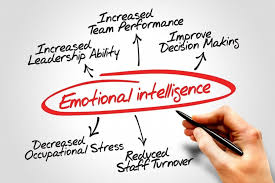Some of you may be quite familiar with the concept of emotional intelligence or emotional quotient (EQ) while others of you may have heard the terms but know little about them. Regardless of your level of knowledge or experience with emotional intelligence, here is a look at some of the basics.
The term “emotional intelligence” (EI) was coined in the early 1980s but Daniel Goleman popularized the concept in the late 1990s, focusing on workplace application. In his ground-breaking book Emotional Intelligence, Goleman posited that 90% of the difference between star performers and average performers in the workplace was related to EQ.
Emotional intelligence refers to personal characteristics and social abilities that are closely tied to success in both our professional and personal lives. A definition that we like for emotional intelligence is a person’s ability to sense, understand and effectively apply the power and acumen of emotions to facilitate high levels of collaboration and productivity. Emotional Quotient (EQ), on the other hand, is a measure of emotional intelligence.
Although emotional intelligence is a fairly new concept, it has received a lot of attention, especially in the last 10-15 years. And that attention is for good reason because, for example, researchers who study emotional intelligence have found that those with high EQ are, on average, seeing greater success in their careers (which includes making more money) and proving more effective in their roles compared to those who don’t demonstrate high emotional intelligence.
Research also shows that successful leaders and superior performers have well-developed emotional intelligence skills. This makes it possible for them to work well with a wide variety of people and to respond effectively to rapidly changing conditions in the business world. In fact, a person’s EQ is likely a better predictor of performance and success than intelligence (as measured by “intelligence quotient” or IQ).
EQ skills aren’t confined to performance and success at work, though – they carry over into nearly every aspect of life; capturing the entirety of who YOU are as an individual and having a tremendous impact on your overall well-being. Luckily, EQ isn’t a “you have it, or you don’t” type of characteristic; rather, it’s a set of skills that can be learned and continually improved.
Delving deeper into the subject, it is important to understand that there are five (5) dimensions of emotional intelligence. They are:
- Self-Awareness – the ability to recognize and understand your moods, emotions and drives, as well as their effect on others.
- Self-Regulation – your ability to control or redirect disruptive impulses and moods and the propensity to suspend judgment and think before acting.
- Motivation –a passion to work for reasons that go beyond the external drive for knowledge, utility, surroundings, others, power or methodology and are based on an internal drive or propensity to pursue goals with energy and persistence.
- Social Awareness – the ability to understand the emotional makeup of other people and how your words and actions affect others.
- Social Regulation – your ability to influence the emotional clarity of others through a proficiency in managing relationships and building networks.
One of the tools that we frequently use with our clients is TTI Success Insights’ Emotional Quotient assessment. This assessment evaluates a person’s level of emotional intelligence across the five dimensions listed above and provides insights into which areas to focus on to raise one’s EQ plus some suggestions for doing so.
Emotional intelligence is an area you can focus on and develop, regardless of your current level of acumen in each dimension. There are many ways to work on your emotional skills, but the important thing to remember is that it takes patience and practice, because these aren’t skills that you can develop overnight.
Emotional Intelligence is arguably the singular competency that can help both employees and employers get out of a funk faster. EQ has never been more relevant in the workplace than it is now and will continue to be in the coming years…and the ability to recognize and regulate emotions and harness them for high performance will be paramount.
While we can expect our understanding of emotional intelligence to continue to evolve as it is studied, EQ is here to stay. It continues to gain significant prominence in both academia and the corporate world. There is reason to believe that, unlike so many other concepts in the human capital space that have come and gone, EQ is growing in acceptance and practice.

